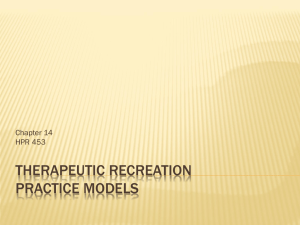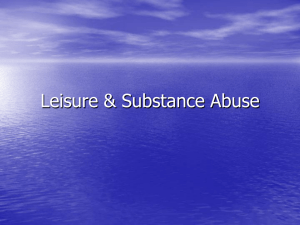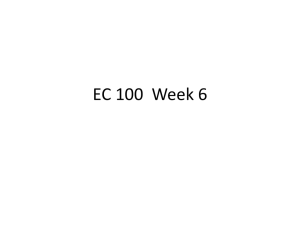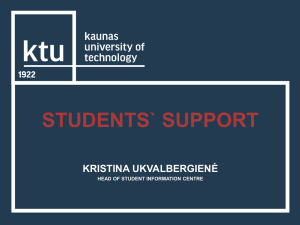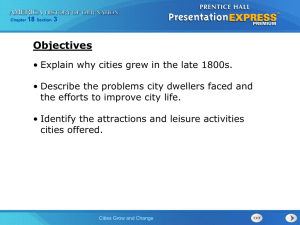New Possibilities for Meaningful Leisure Experiences
advertisement
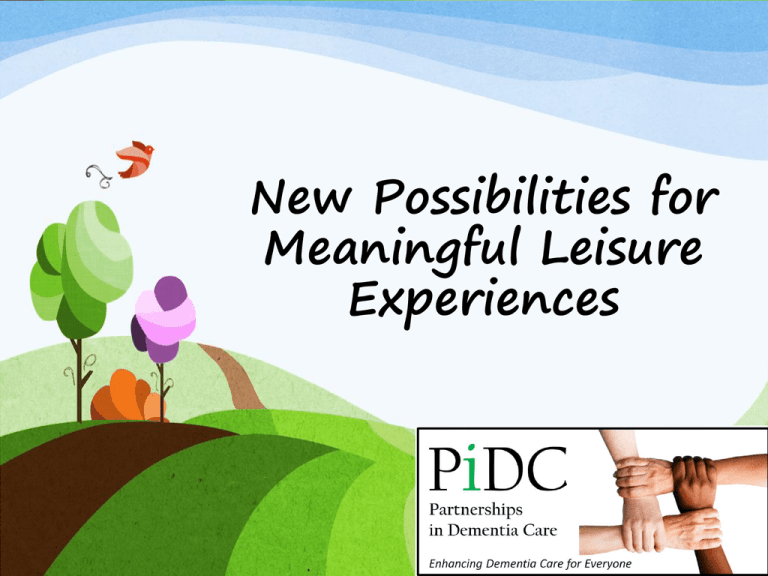
New Possibilities for Meaningful Leisure Experiences Objectives • Reflect on the impact of the institutional, medical model of care on leisure policies, practices, and experiences in long-term care homes • Consider how a community, relational model of living might reshape leisure policies, practices, and experiences in long-term care homes • Learn about Authentic Partnerships and Living and Celebrating Life through Leisure • Envision new possibilities for meaningful leisure experiences Getting to know each other… • Divide into pairs • Introduce yourself to your partner and interview each other using the following question: Thinking about your personality, what type of building would you be if you were a building? What type of kitchen utensil? What type of transportation vehicle? • We will invite those who wish to share what you found out Creating a safe space …. • What do you need to feel safe to share your stories, experiences, and opinions? • What do you need from your facilitators? • What do you need from your colleagues? • What do you need from the space to participate in meaningful ways? Culture Change… • is an organic on-going and evolving process • involves critically examining the language, values, assumptions, attitudes, practices, approaches, and policies embedded within an organisation • is a movement from the medical/institutional model of care to a relational/social model of living • involves the development and implementation of a comprehensive set of fundamental reforms in order “to create caring communities where both empowered front-line staff and [Elders and families] can flourish” (Rahman & Schnelle, 2008, pp.142-143) Culture Change is NOT… • an end product or outcome • solely a quality improvement initiative • a specific program or model of care that is implemented • a one-size fits all approach • top-down mandate imposed by others • easy Reflections on the medical, institutional model of care Small Group Exercise #1 • Take turns to read out the characteristics of the medical/institutional model outlined on the handout • Based on your experiences and observations, together identify some of the impacts of the institutional/medical model on leisure policies, practices and experiences in long-term care homes • Create a skit that presents some of the impacts you discussed Dramatic Performances and Large Group Discussion • Which aspects of the institutional, medical model are observed in each of the performances? • What are the similarities and differences between the performances? • What other impacts are you aware of that were not shown in the skits? Recreational Therapy • a treatment service designed to restore, remediate and rehabilitate a person’s level of functioning and independence in life activities, to promote health and wellness as well as reduce or eliminate the activity limitations and restrictions to participation in life situations caused by an illness or disabling condition. (ATRA, 2009) Therapeutic Recreation • a profession which recognizes leisure, recreation and play as integral components of quality of life. Service is provided to individuals who have physical, mental, social or emotional limitations which impact their ability to engage in meaningful leisure experiences. • is directed toward functional interventions, leisure education and participation opportunities. These processes support the goal of assisting the individual to maximize the independence in leisure, optimal health and the highest possible quality of life. (CTRA) Common Implications • Dominance of the biomedical paradigm undervaluing of leisure and a diversional or therapy focus (i.e., recreation as distraction, treatment or intervention) undermines personhood • Professionalization of activities and recreation departmentalized approach • Large group programs and too few individually meaningful opportunities • Structured programs and too few spontaneous and self-initiated opportunities disrupts the rhythms of daily life Common Implications (cont’d) • Assessments tend to focus on measuring functional levels in order to identify deficits in need of treatment or intervention • Limitations experienced are often attributed to the illness or disability with little regard for social or environmental factors • Valuing independence over interdependence • Little attention is given to strengths and continued abilities, and how Elders themselves think about recreation and leisure in their lives Small Group Exercise #2 • On your tables you will find an envelope with quotes from our research with persons living with dementia • Read the quotes aloud • Discuss together: • What are the consequences of the medical, institutional model on older adults reflected in the quotes? Reflections on culture change values and the relational, social model of living Guided Imagery Exercise Small Group Exercise #3 • In small groups, take turns sharing the images you envisioned • After everyone has shared, together choose three words to describe how your group’s images were different from the impacts presented in the skits • We will hear a sample of responses Culture Change Values… • Choice and self-determination • Dignity and respect • Nurturing body, mind and spirit • Knowing and focusing on the person • Living life • Enabling, normalizing environments • Close interdependent relationships • Collaborative decision-making • Flexibility Small Group Exercise #4 • Take turns to read out the characteristics of the relational/social model outlined on the handout • Together discuss what would need to change in your earlier skit to align the leisure policies, practices and experiences with the relational/social model? • Transform your earlier skit into a new skit that reflects the relational/social model Dramatic Performances and Large Group Discussion • Which aspects of the relational, social model are observed in each of the performances? • What are the similarities and differences between the performances? • How might individual experiences change if the relational, social model was a reality? Alternative Meanings of Leisure in LTC Paired Interviews on Leisure • Find a partner you have not worked with before • Together explore what leisure means to each of you and what you would need for meaningful leisure if you moved into a LTC home? What would you want your leisure to look like? • Share with the larger group Leisure is an Experience “It is the quality of the experience of doing the activity, not the activity itself, that makes it leisure. Leisure is mainly motivated by intrinsic reasons, that is, the activity is chosen because of the meaningful qualities it holds for the individual. Therefore, leisure is primarily an experience.” (Kelly, 1982) Leisure is an Expression of Our Humanity “Of all species, humans are the biggest players of all. We are built to play and built through play. When we play, we are engaged in the purest expression of our humanity, the truest expression of our individuality… It energizes us and enlivens us. It eases our burdens. It renews our natural sense of optimism and opens us up to new possibilities… Play is the vital essence of life. It is what makes life lively.” (Brown, 2009) Leisure is Well-Being “Leisure provides the opportunity to consider the kind of life a person wishes to live, permitting reflection on the personal meaning of well-being and how it might be achieved… leisure provides the opportunity to do those things people consider meaningful and worthwhile… leisure allows people to reflect and to realize the personal values that constitute their wellbeing.” (Sylvester, 1992) Leisure is a Human Right “Leisure is among a new generation of human rights. Like other rights, awareness and acceptance of the right to leisure will require time… It will necessitate individuals sufficiently courageous to challenge the status quo. Serious consideration of the right to leisure, moreover, will call for reform in therapeutic recreation. What calling the field of therapeutic recreation ultimately chooses to hear, however, and how well it responds, remains to be seen. History will be our judge, as time will either tell on us or about us.” (Sylvester, 1992) We must reach beyond therapy and diversion and “Leisure… embrace leisure is the celebration of freedom at its crowning point.” (Sylvester, 1987, p. 81) New Possibilities From an Emphasis on To an Emphasis on Assessment as a OneWay Process Dialogue- and RelationshipCentered ‘Getting to Know Each Other’ Functional Domains (cognitive, physical, social, emotional, spiritual, and psychological) Valued Leisure Experiences Functional Limitations Abilities, talents, gifts, aspirations Activity Interests Knowing the Whole Person Diversional or Therapeutic Meaningful Small Group Exercise #6 • Work together to identify new possibilities you can envision for meaningful leisure experiences within your LTC environment, possibilities that align your leisure practice with the culture change values • Write each possibility on a separate post-it note and post on the wall • We will hear a sample of your new possibilities Dot-mocracy • Take five minutes and circulate among the new possibility themes • Choose the new possibility or possibilities for leisure that energise you the most • Place your three ‘sticky dots’ beside your favourite new possibilities – you can put all dots on one or beside three separate ones Small Group Exercise #7 • Each of the small groups will be assigned one of the new possibilities to work on • Using the Designing Our Way Forward Table, identify three to five actions (things that would need to happen/change) and the supports/resources needed in order to achieve each of the new possibilities • Share your actions with the larger group Watch yourself. Every minute we change. It is a great opportunity. At any point, we can step out of our frozen selves and our ideas and begin afresh. (Natalie Goldberg, 1986, Writing Down the Bones) What Will You Do? In order to support the meaningful leisure experiences of those with whom I work, I plan to… Please write your goal in the space provided on your handout. Reflections on the Day Learning Circle Please share: What was this experience like for you today? Thank You! • Other comments or questions • Email: sldupuis@uwaterloo.ca jdcarson@uwaterloo.ca cwhyte@brocku.ca

